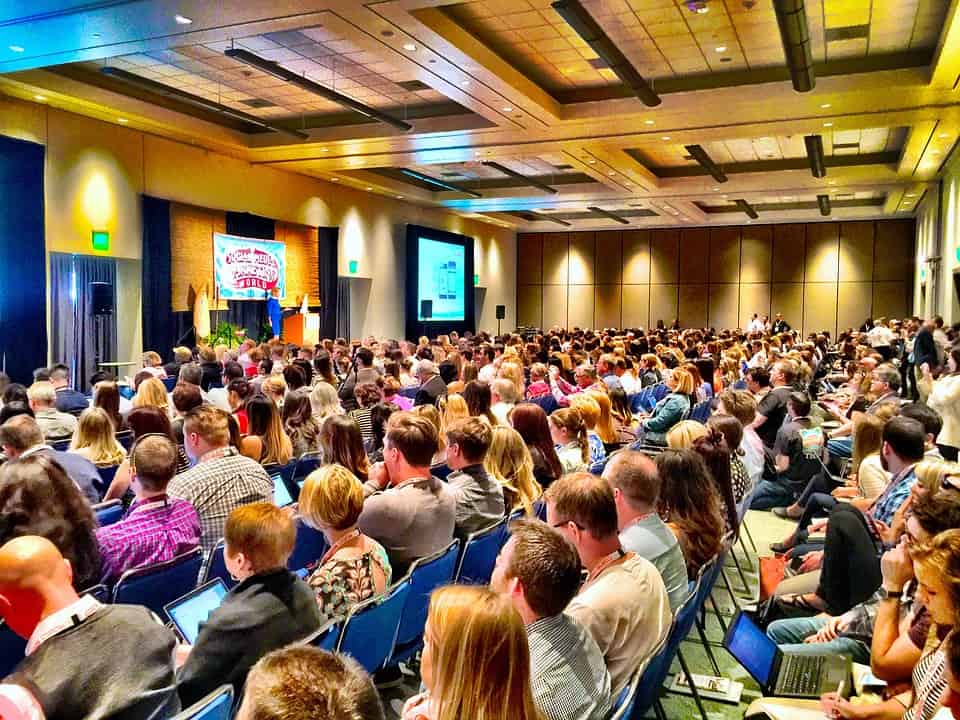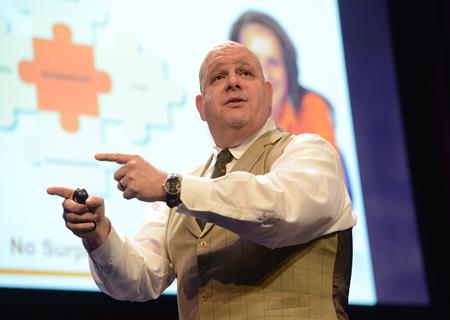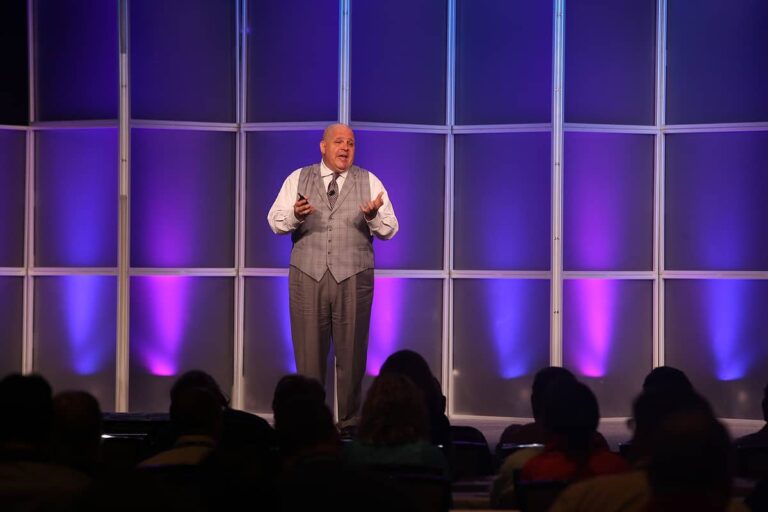
I have been a professional speaker for more than 28 years. As with most people, I’m often asked what I do. Often, when I respond with, “I’m a professional speaker,” people often then ask some variation of the question, “What does a professional speaker do?”
Here’s my answer:
A professional speaker gets paid to make people’s lives better by delivering valuable content at events through speeches and training programs.
There is a nearly endless number of ways that a professional speaker can help.
It might be improving the profitability of their company, increasing sales, building better leaders, or creating high-performance teams
It could also be reducing stress, allowing people to spend more time with their family, to be healthier, to raise better children, or to just laugh and have fun for an hour.
It is all about creating positive change for the audience and the kind of change a professional speaker wants to achieve determines the way they approach building their programs.

Different Types of Professional Speakers
Motivational Speaker
A professional speaker that focuses on motivation is there to excite and energize people.
This type of speaker is typically animated, fast-paced, and loud. They want to get the audience blood flowing and create a high level of energy in the room.
A motivational speaker relies heavily on storytelling, sometimes their own story, or sometimes stories they have collected and woven together into a powerful and engaging program.
Many professional and Olympic athletes and coaches have become motivational speakers.
Inspirational Speaker
The professional speaker that focuses on inspiration is there to change the way people think and behave.
Most often, an inspirational speaker is a bit more subdued than a motivational speaker, but still delivers an emotional, engaging, and exciting program that connects with the audience.
People who have accomplished incredible achievements, such as climbing Mount Everest, or who have endured great hardships but overcome them are often inspirational speakers.
Generally speaking, motivational speakers get people riled up and energized, whereas inspirational speakers strive to create a lasting change in the members of the audience.
Persuasive Speaker
A professional speaker that focuses on persuasion uses facts, details, data, and research to create a program will change people’s perceptions and behaviors.
Persuasive professional speakers are also typically subdued but can get emotional if the topic requires it.
A good model to look at are lawyers, who must build a case to convince a jury of their point of view or politicians who are trying to persuade people to vote for them.
Although it is essential for all professional speakers to make a strong connection with their audience, it is especially critical for a persuasive speaker because the audience must like you enough to consider changing the way they think.
Educational
The professional speaker who focuses on education is there to teach ideas, tools, and techniques that will help the audience learn new things they can implement in their lives and/or businesses.
This type of speaker needs to be well researched, with facts, details, and recommendations for how people can take what they are learning and implement it.
Educational speakers often deliver keynotes and workshops and sometimes serve as consultants and executive coaches.
Entertaining
A professional speaker that focuses on entertainment is there to help people have an enjoyable time. This would be musicians, comedians, magicians, and other similar entertainers.
Some speakers have programs that would be considered “edutainment,” an entertaining and fun program that also delivers valuable business and/or life lessons.
The difference between an educational professional speaker and an entertaining professional speaker is simply where they place their focus. It’s either an educational program that happens to be fun and entertaining or an entertaining program that happens to teach a few ideas as well.
Provocative
A professional speaker who focuses on being provocative is there to shock people with their thinking and possibly persuade them to a new point of view. This sort of speaker builds programs around topics that are controversial, such as politics or religion.
Many times, they speak in front of audiences they know disagree strongly with them. Provocative speakers can be loud and brash or try to overpower the audience with their intellect.
Key Activities For Building A Business As A Professional Speaker
In case you’re considering becoming a professional speaker, here are some of the key activities you’ll need to focus on.
Be so good you can’t be ignored
The number one job of a professional speaker is to create amazing programs.
Great professional speakers are continually working to improve the quality of their speeches and workshops. They are researching to find new ideas to put in their programs, scripting their speeches, practicing, and working on stagecraft to make sure they can consistently deliver excellence to the audience.
Often, this includes taking time to go to watch other speakers present live or study their work on YouTube.
Travel
To become a professional speaker who is earning in the high six figures or even seven figures, you’re going to have to travel a lot.
Most top-tier professional speakers travel upwards of 200 days a year, with a good portion of it international.
That’s a lot of time away from home, living in airports and hotels and eating meals in restaurants hundreds of times a year. If you do not aspire to be a speaker at that level, it is possible to be a successful professional speaker only traveling once or twice a month.
Travel is often one of the major hurdles for people that want to be a high-level professional speaker but have a family they don’t want to be away from too much.
Build a brand
A big part of being a professional speaker is realizing YOU are the product. This means you must be excellent at branding, marketing, and selling you and your programs.
The challenge is to differentiate yourself from the thousands of other speakers that an organization could hire instead of you.
What makes you unique and valuable? How will you position yourself in the marketplace compared to other speakers who provide similar content?
Create great content
Highly paid professional speakers spend a great deal of time developing excellent content.
This is, of course, your program, but might also include a blog, a podcast, writing articles for major magazines and perhaps even writing a book.
For some speakers, it includes research and developing new ideas that will allow them to be a thought leader.
To build a reputation as excellent in the area you speak on it is essential that you build a platform of followers who are enthusiastic about what you do and creating great content is the path to achieve this.
Be an entrepreneur
Many professional speakers do not realize that the most significant portion of their job is to run a speaking business.
As you improve and grow your speaking career, you will soon have to deal with things like managing other people, payroll, logistics, taxes, and other business issues.
This is where many speakers fail, they love getting up on the stage and positively changing people’s lives, but they’re not very excited about being an entrepreneur.
Without a strong “business” focus, it is impossible to build a successful and lucrative speaking business.
Sell, sell, sell
At least at the beginning of your career, you’re going to have to spend a lot of time trying to sell speeches and workshops.
Many people do not like to sell, it seems pushy or aggressive, but if you have developed a world-class program, then you should be proud to sell it to anyone that would be willing to pay.
Once you have built up a good client roster, and continue to improve your program, eventually your entire business will run off referrals, and you will have to do very little marketing, cold calling, or selling.
Final Thoughts
As you’ve seen, there is a lot more to becoming a successful professional speaker than just getting up on the stage and delivering an excellent program.
However, when your entire career is focused on helping other people and making a positive impact on their lives, all of the other work is a small price to pay to have such a powerful impact.
I hope this was helpful to you.
– John Spence


